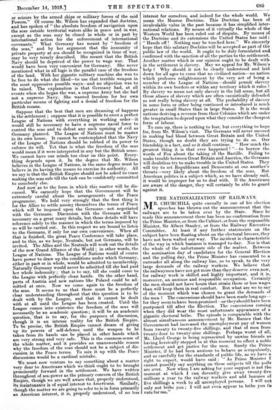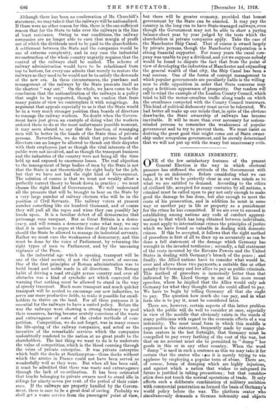THE NATIONALIZATION OF RAILWAYS.
MR. CHURCHILL quite casually in one of his election speeches has thrown out the announcement that the railways are to be taken over by the State. Since he made this announcement there has been no confirmation from the Prime Minister, or from the Cabinet, or from the responsible Minister, Sir Albert Stanley, or from the Railway Executive Committee. At least if any further statements on the subject have been floating about on the electoral breezes, they have not been wafted our way. The incident is characteristic of the way in which business is managed to-day. Nor is that the whole of the unfortunate side of the matter. Between the nomination day of candidates for the General Election and the polling day, the Prime Minister has consented to a surrender all along the railway line, so to speak, to the very large demands of the railway workers. We believe that the railwaymen have not got more than they deserve even now, for railway work is skilled. and highly important, and it is, moreover, an anxious and responsible occupation. Certainly the men should not have hours that strain them or less wages than will keep them in real comfort. But what are we to say of the moment which was chosen to grant the demands of the men ? The concessions should have been made long ago— for they seem to have been promised—or they should have been postponed till after the Election. The concessions coming when they did wear the most unfortunate appearance of a gigantic electoral bribe. The episode is comparable with the almost simultaneous announcement by Mr. Barnes that the Government had increased the unemployment pay of women from twenty to twenty-five shillings, and that of men from twenty-four to twenty-nine shillings. Perhaps worst of all, Mr. Lloyd George is being represented by unwise friends as having heroically stepped in at this moment to effect a noble settlement and get Justice for the men. Surely the Prime Minister, if he had been anxious to behave as scrupulously, and as carefully for the standards of public life, as we have a right to expect, would have said : "As Prime Minister I cannot possibly say anything on these subjects till the polls are over. Now when I,am asking for your support is not the moment at which I can decently give away twenty-five Millions a year to the railway workers and add bonuses of fiye shillings a week to all unemployed persons. I will not only not bribe you ; I will not even appear to bribe you fo vote for me." Although there has been no confirmation of Mr. Churchill's statement, we may take it that the railways will be nationalized. If there were no other reason for this, there is the one sufficient reason that for the State to take over the railways is the line of least resistance. Owing to war conditions, the railway companies are no longer able to earn that margin of profit out of which the dividends used to be paid to the shareholders. A settlement between the State and the companies would be one of extreme complexity, and in any case the industrial reconstruction of the whole country urgently requires that the control of the railways shall be unified. The scheme of railway administration would have to be refashioned from top to bottom, for every one admits that merely to restore the railways as they used to be would not be to satisfy the demands of the new era. In these circumstances, the purchase and management of the railways by the State presents itself as the shortest "way out." On the whole, we have come to the conclusion that the nationalization of the railways is a policy that ought to be supported, though we confess that. from many points of view we contemplate it with misgivings. An argument that appeals especially to us is that the State would be in a very much stronger position than boards of directors to manage the railway workers. No doubt when the Govern- ment have just given an example of doing what the workers ordered them to do at the most unfortunate possible moment, it may seem absurd- to say that the function of managing men will be better in the bands of the State than of private persons. Nevertheless, we do think that private boards of directors can no longer be allowed to thrash out their disputes with their employees just as though the vital interests of the public were not involved, and as though the transport business and the industries of the country were not being all the time held up and exposed. to enormous losses. The real objection to the management of large bodies of men by the State is not that the State is not theoretically the right body for the job, but that we have not had the right kind of Government. The solution of course is that we must not weakly allow a perfectly correct theory to break down in practice ; we must choose the right kind of Government. We well understand all the pressure that will be brought to bear on the State by a very large number of railway electors who will be ix the position of Civil Servants. The railway voters at present number something like six hundred thousand, and of course they will pull all the ropes and wires they can possibly lay hands upon. It is a familiar defect of all democracies that patronage runs rampant. But as Great Britain is a demo- cracy, and will remain a democracy come what may, we say that it is useless to argue at this time of day that in no case should. the State be allowed to manage its industrial servants. Rather we must cure the weaknesses of democracy, and this must be done by the voice of Parliament, by returning the right types of men to Parliament, and by the unceasing vigilance of the Press.
In the industrial age which is opening, transport will be one of the chief secrets, if not the chief secret, of success. One of the first principles of Roman administration was to build broad and noble roads in all directions. The Roman habit of driving a road stNight across country and over all obstacles was a kind of symbolic act which conveyed the warning that nothing must be allowed to stand in the way of speedy transport. Much more transport and much quicker transport will be needed to encourage our new industries, to serve our more productive fields, to make it possible for small- holders to thrive on the land. For all these purposes it is essential for the railways to have a united policy. Before the war the railways were showing a strong tendency to pool their resources, having become acutely conscious of the waste and extravagance of some of the cruder methods of com- petition. Competition, we do not forget, was in many senses the life-spring of the railway companies, and acted as the incentive of the remarkable services which the companies undoubtedly rendered to the nation at no great profit to the shareholders. The last thing we want to do is to underrate the value of competition, which is the blood coursing through the veins of private enterprise. It was private enterprise which built the docks at Southampton—those docks without which the armies in France could not have been served so wonderfully well as they were. But when all has been said, it must be admitted that there was waste and extravagance through the lack of co-ordination. It has been estimated that trucks belonging to private owners used to stand idle in sidings for ninety-seven per cent. of the period of their exist- ence. If the railways are properly handled by the Govern- ment, there is sure to be a great deal of saving. Probably we shall get a worse service from the passengers' point of view, but there will he greater economy, provided that honest government by the State can be exacted. It may pay the country in the long run to have State-managed railways, even though the Government may not be able to show a paying balance-sheet year by year judged by the tests which the shareholders in private companies apply. Take the case of the Manchester Ship Canal. That of course is owned largely by private persons, though the Manchester Corporation is a strong financial supporter. For many years the canal com- pany was unable to pay a dividend, and yet we suppose nobody would be found to dispute the fact that from the point of view of developing the industries of Manchester and expanding the general wealth of that city, the Ship Canal has been a real success. One of the forms of corrupt management to which popular governments are peculiarly liable is the willing- ness to stifle opposition in order that State concerns may enjoy a fictitious appearance of prosperity. Our readers will call to mind the example of the London County Council, which tried to kill the motor-omnibus traffic along roads on which the omnibuses competed with the County Council tramways. This kind of political dishonesty must never be tolerated. We had better all make up our minds that, in spite of the obvious drawbacks, the State ownership of railways has become inevitable. It will be more than ever necessary for serious- minded persons to remember the weaknesses of popular government and. to try to prevent them. We must insist on deriving the great good that might come out of State owner- ship under scrupulous government, and be sternly determined that we will not put up with the many but unnecessary evils.







































 Previous page
Previous page